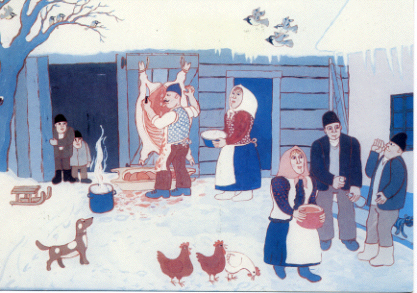Fuzzy and Harriet
(Washington Post, Sunday Magazine, 11/06/05)
By Gene Weingarten
Before initiating the writing of a newspaper column in which the implementation of a plan of humor is to be effectuated, the prioritization of goal-oriented objectives is warranted so as to rhetorically establish, by effective utilization of satirical example, that Harriet Miers writes this way.
She does. Harriet would have been a very scary Supreme Court justice, but not for the reasons that doomed her. Much was made of her religious convictions, her lightweight constitutional background, and her high regard for George W. Bush -- her admiration of his intellect, her support for his conservative policies, her willingness to do his laundry, etc. But her writing was especially instructive. Did you see it? Her prose makes an apartment lease read like Hemingway. She is windier than Katrina, wordier than Roget, blander than a Perry Como-Barry Manilow duet. In the passive voice are written all her sentences, and they are as convoluted as Einstein's brain. And yet for all this jargonized verbiage, she never quite gets to the, you know.
Here is an actual quote from one of Harriet's legal articles:
"We have to understand and appreciate that achieving justice for all is in jeopardy before a call to arms to assist in obtaining support for the justice system will be effective."
Here's another:
"An organization must also implement programs to fulfill strategies established through its goals and mission . . . With the framework of mission, goals, strategies, programs, and methods for evaluation in place, a meaningful budgeting process can begin."
Now, I'm not saying that you have to be a great writer to be a Supreme Court justice, but clarity helps. Brevity, too. Imagine the decisions that would have been written by a Justice Miers:
Brown v. Board of Education , as written by Chief Justice Earl Warren:
"We conclude that, in the field of public education, the doctrine of 'separate but equal' has no place. Separate educational facilities are inherently unequal."
Brown v. Board of Education , as written by Harriet Miers:
"We conclude that, in the field of public education, it
cannot be contended that what fails to be non-separate can be construed to be not unequal. In facilitating facilities-planning, it is essential that educational institutions that lack un-identical facilities and faculties are inconsistent with what is not undesirable, so help us God."
- - -
This is not unimportant stuff. The fact is, history pivots on clarity. Imagine Nathan Hale, on the gallows, summarizing eloquently and succinctly the emotional commitment that united the colonists in their battle to be recognized as a free and independent state. Imagine how it must have energized the faithful when news of his brave final words spread:
"I regret that I have but one life to give for my country."
Now imagine Harriet, with equal bravery and equally noble intent, on those same gallows:
"It is indeed regrettable, under circumstances such as those in which we find ourselves, that, having been afforded an opportunity to articulate such thoughts, ruminations, postulations and explanatory remarks as might be appropriate considering the exigencies of the gaaack . . ."
I'm sorry the nomination was pulled, because wouldn't it have been great if, in an effort to save her, she got some writing advice from the man whom she declared "brilliant," her mentor, George W. Bush? Whatever his flaws, it can never be argued that George, in his tireless fight against evildoers and enemies of freedom, makes things seem more complicated than they are.
Imagine being a fly on the wall during the instructional sessions:
George: Harriet, your writing needs to more simplificationalized.
Harriet: But, George, sometimes the contextualization that is necessitated by complexities of situational options and nuanced subtleties of interpretation requires modes of expression that are not incompatible with the failure to not communicate with occasional ambiguities.
George: Harriet, Harriet, Harriet. Speaking with clearness and simplitude are one of the most important tenants of a free society. "Tenants" is a word that means "principles."
Harriet: I don't understand. Regarding the things to which I am addressing myself, I fail to discern a lack of precision of language, expression, contention or argument.
George: No, no, no! There you go again, overexplanificating.
-----
P.S. Harriet's withdrawal letter contains this line: "I have decided that seeking my confirmation should yield."


